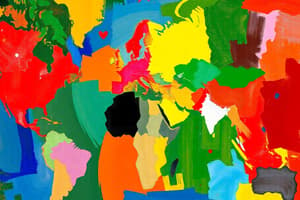Podcast
Questions and Answers
Which statement best captures the concept of sovereignty in international relations?
Which statement best captures the concept of sovereignty in international relations?
- Sovereignty is irrelevant in the context of global organizations.
- Sovereignty means that a state has complete control over its territory and international affairs. (correct)
- Sovereignty refers strictly to a state's ability to engage in trade.
- Sovereignty is defined as cooperation between nations for mutual benefit.
What distinguishes a nation from a state?
What distinguishes a nation from a state?
- A state has a defined territory, while a nation does not.
- Both terms are synonymous in the context of international relations.
- A nation has formal political recognition, while a state primarily encompasses cultural identity.
- States are recognized by other states, while nations consist of shared identities. (correct)
How does the notion of an anarchic system influence international relations?
How does the notion of an anarchic system influence international relations?
- It emphasizes the lack of a central authority, leading to greater competition and conflict. (correct)
- It creates a uniform set of rules applicable to all nations.
- It promotes stronger global governance structures among states.
- It leads to increased reliance on international courts for conflict resolution.
What role does diplomacy play in resolving international conflicts?
What role does diplomacy play in resolving international conflicts?
Which example best illustrates the difference between an intergovernmental organization (IGO) and a supranational organization?
Which example best illustrates the difference between an intergovernmental organization (IGO) and a supranational organization?
What principle is underscored by international law as illustrated in the Lotus Case?
What principle is underscored by international law as illustrated in the Lotus Case?
In what way has the emergence of human rights norms impacted the traditional concept of sovereignty?
In what way has the emergence of human rights norms impacted the traditional concept of sovereignty?
What are the four ethical positions concerning human protection in international relations?
What are the four ethical positions concerning human protection in international relations?
Why is defining transnational terrorism critical in international relations?
Why is defining transnational terrorism critical in international relations?
What is the distinction between private goods and public goods in the context of international relations?
What is the distinction between private goods and public goods in the context of international relations?
What is free trade?
What is free trade?
What are factors that contribute to a state's comparative advantage?
What are factors that contribute to a state's comparative advantage?
Which concept emphasizes that markets determine the right price?
Which concept emphasizes that markets determine the right price?
Which of the following is NOT considered a barrier to trade?
Which of the following is NOT considered a barrier to trade?
What is meant by currency being a tradable commodity?
What is meant by currency being a tradable commodity?
Which of the following best describes government interventions in trade?
Which of the following best describes government interventions in trade?
What are examples of market imperfections affecting trade?
What are examples of market imperfections affecting trade?
What is the primary purpose of holding reserves of foreign currencies and gold?
What is the primary purpose of holding reserves of foreign currencies and gold?
What characterizes economic liberalism regarding trade?
What characterizes economic liberalism regarding trade?
What is the role of tariffs in government intervention?
What is the role of tariffs in government intervention?
What is the primary indicator used to measure economic development according to the provided content?
What is the primary indicator used to measure economic development according to the provided content?
Which of the following is NOT mentioned as a method through which countries can obtain funding?
Which of the following is NOT mentioned as a method through which countries can obtain funding?
How does inflation affect economic perception according to Herb Stein's quote?
How does inflation affect economic perception according to Herb Stein's quote?
Which of the following elements is part of economic development as mentioned in the content?
Which of the following elements is part of economic development as mentioned in the content?
What does the Gini coefficient measure in the context of economic development?
What does the Gini coefficient measure in the context of economic development?
Which of these is considered one of the three pillars of development according to neoliberal economic policy?
Which of these is considered one of the three pillars of development according to neoliberal economic policy?
What does 'remittances' refer to in the context of funding for countries?
What does 'remittances' refer to in the context of funding for countries?
Which factor does NOT contribute to the measurement of economic development listed in the content?
Which factor does NOT contribute to the measurement of economic development listed in the content?
Which of the following statements best describes the relationship between exchange rates and international markets?
Which of the following statements best describes the relationship between exchange rates and international markets?
Which of the following represents a goal of sustainable development?
Which of the following represents a goal of sustainable development?
Flashcards
Sovereignty
Sovereignty
Supreme authority and power of a state within its territory; independence from external control.
State vs. Nation
State vs. Nation
A state is a political entity with a defined territory and government, while a nation is a group of people sharing a common identity, culture, and history not always confined to a single state.
Anarchic System
Anarchic System
Absence of a world government in international relations; states operate in a self-help system.
Diplomacy Success/Failure
Diplomacy Success/Failure
Signup and view all the flashcards
IGO vs. Supranational Org
IGO vs. Supranational Org
Signup and view all the flashcards
International Law
International Law
Signup and view all the flashcards
Human Rights Challenge Sovereignty
Human Rights Challenge Sovereignty
Signup and view all the flashcards
Ethical Positions on Human Protection
Ethical Positions on Human Protection
Signup and view all the flashcards
Transnational Terrorism
Transnational Terrorism
Signup and view all the flashcards
Private vs. Public Goods
Private vs. Public Goods
Signup and view all the flashcards
Free Trade
Free Trade
Signup and view all the flashcards
Comparative Advantage
Comparative Advantage
Signup and view all the flashcards
Economic Liberalism
Economic Liberalism
Signup and view all the flashcards
Barriers to Trade
Barriers to Trade
Signup and view all the flashcards
International Finance
International Finance
Signup and view all the flashcards
Currency
Currency
Signup and view all the flashcards
Exchange Rates
Exchange Rates
Signup and view all the flashcards
Inflation
Inflation
Signup and view all the flashcards
Economic Development
Economic Development
Signup and view all the flashcards
Capital Accumulation
Capital Accumulation
Signup and view all the flashcards
GDP/capita
GDP/capita
Signup and view all the flashcards
Gini Coefficient
Gini Coefficient
Signup and view all the flashcards
Human Development Index (HDI)
Human Development Index (HDI)
Signup and view all the flashcards
Sustainable Development Goals
Sustainable Development Goals
Signup and view all the flashcards
Neoliberal Economic Policy
Neoliberal Economic Policy
Signup and view all the flashcards
Trade
Trade
Signup and view all the flashcards
World Bank/IMF Loans
World Bank/IMF Loans
Signup and view all the flashcards
Foreign Aid
Foreign Aid
Signup and view all the flashcards
Overseas Development Assistance (ODA)
Overseas Development Assistance (ODA)
Signup and view all the flashcards
Foreign Direct Investment (FDI)
Foreign Direct Investment (FDI)
Signup and view all the flashcards
Microfinance
Microfinance
Signup and view all the flashcards
Remittances
Remittances
Signup and view all the flashcards
Study Notes
Exam #2 Review - POLS 160
- Week 8: IPE, 1: International trade: exchange of goods and services across borders.
- What is (free) trade?: Free trade is trade without barriers.
- Comparative Advantage: States have a natural advantage in producing goods and services. These advantages depend on natural resources, labor force characteristics, technology, and geography (shipping/transaction costs).
- Economic Liberalism: The market knows the right price, states should stay out of trade, and emphasizes absolute gains.
- Government Intervention: Barriers to Trade:
- Tariffs: Import taxes.
- Non-tariff barriers: Quotas, subsidies, restrictions and regulations.
- "Market imperfections:" Corruption, monopolies, and oligopolies.
Week 9: IPE, 2
- Finance: Finance is the movement of money/currency across state borders.
- Currency: Sole legal tender of a country. National currencies are of no inherent value in another country and can be exchanged. Countries tend to hold reserves of foreign currencies and gold as backup/safety.
- Exchange Rates: How much one currency is worth on the international market compared to other currencies or gold.
- Inflation: An increase in the price of goods and services ("Too many dollars chasing too few goods," Herb Stein).
Week 10: Development
- Development: Often refers to economic growth, but also entails much more.
- What is (Economic) Development?: Includes capital accumulation, rising per capita income, falling birthrates, skilled population, adoption of new technology, and social progress.
- How do we measure development?: GDP/capita, GINI coefficient, Human Development Index, and Sustainable Development Goals.
- How do we promote development?: Revisit neoliberal economic policy with three pillars: trade, finance, and get domestic "house" in order (austerity measures).
Countries Need $$$: How do they get it?
- Trade
- World Bank & IMF Loans
- Foreign Aid
- Overseas Development Assistance (ODA)
- Oxfam Model
- Foreign Direct Investment (FDI)
- Microfinance
- Remittances
Studying That Suits You
Use AI to generate personalized quizzes and flashcards to suit your learning preferences.




